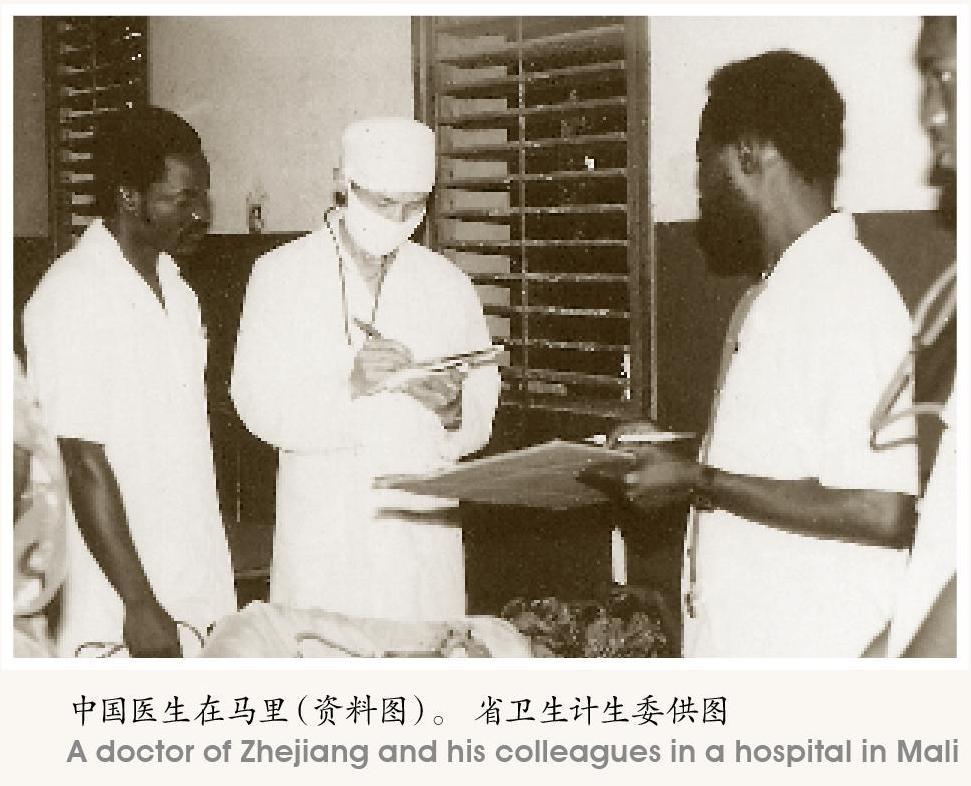半个世纪,浙江医生情暖非洲
2018-05-09陈宁
陈宁
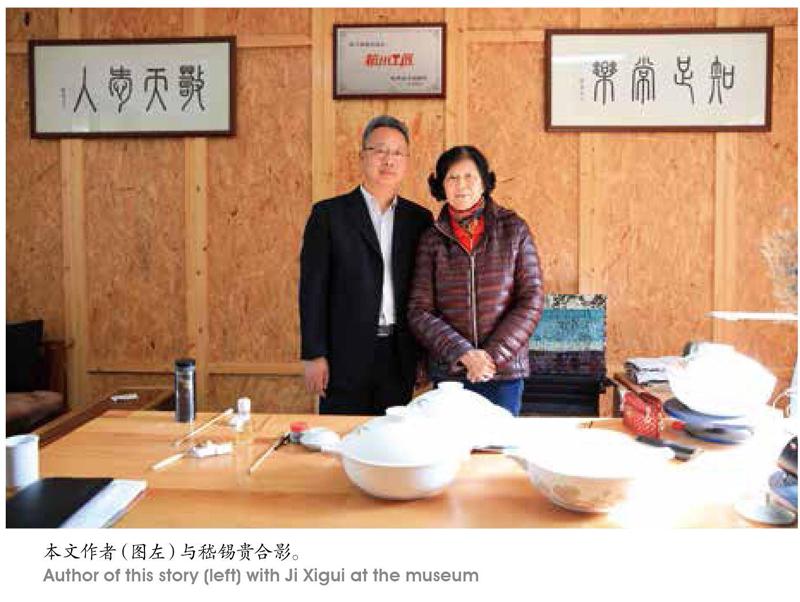
2月,平缓的尼日尔河穿过马里首都巴马科城,蜿蜒的河道绵延至远方。又一个春天即将来临,河水淌过之处,新的生命正在酝酿。
1968年2月,在流域北部的马尔格拉,20位浙江青年筚路蓝缕,写下浙江省援非医疗的序曲。50年间,浙江省已派出25批援马里医疗队,共计825人次,为当地提供门、急诊服务总计931万多人次……
近日,笔者万里赴西非,亲历援非医疗。半个世纪后的今天,我们把目光定格在13000公里之外,听听新老队员的马里记忆,见证这段跨越时空的中马友谊——
峥嵘岁月勇战种种艰难困苦
又是一个新春佳节,马里正值干燥的冬季。夜已深,中国第25批援马里医疗队队长余仁桥案前的台灯依然亮着。他又一次翻开手边的笔记本,核对第二天全体队员下乡义诊的线路、时间、物资和应急方案,并在捐赠物资一栏,添上了一箱常用藥。
第二天一早,25名队员准时赶到35公里之外的KIRINA村,村子的卫生室外已经排起长队。队员周天安、随队翻译邹毅等人穿上印着中国国旗的白大褂,在一间简易的诊室内搭起眼科仪器,用中文、法语、邦巴拉语,开启了一天的工作……
不通的语言、不同的肤色,就这样一次次交集在同一个空间里,串起了50年历史长河中,中国援非医疗的过去、现在与未来。
1960年,中国与马里建交。从1968年开始,浙江省承担了援马里医疗队的选派任务。1968年2月12日,来自内、外、妇、儿、针灸、放射、麻醉、检验、护理等科的20名医疗专业人员抵达马里,把医疗援助的地点选在了距离马里首都巴马科285公里之外的马尔格拉。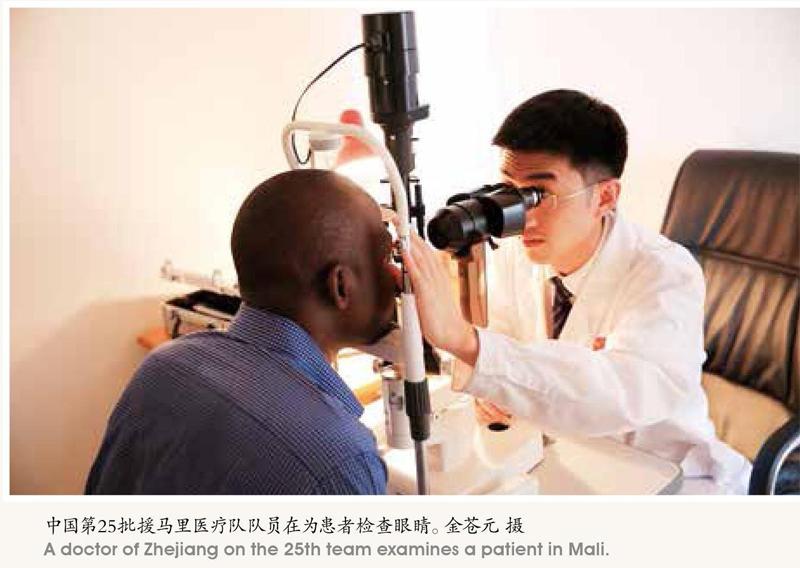
峥嵘岁月,定格在中国第1批援马里医疗队队员的心中——
医院设在马尔格拉下辖的马西纳省,没有供水、没有供电、没有足够的宿舍……年轻队员就轮流到尼日尔河里挑水,一人一盏桅灯点着煤油照明。
比起生活上的困难,当地医疗卫生条件的简陋,才是队员们面临的最大挑战。
护士吴永红回忆,当时医院里连基本的血清标本都没有。知道自己血型的队员就抽出自己的血,逐一与患者作比对,从而推测他们的血型。
受卫生条件限制,当地的孕产妇死亡率、新生儿死亡率居高不下。妇产科医生陈秋波就带着队员给新生儿进行人工呼吸,抢救了一个又一个幼小的生命。有一次,一位产妇大出血,陈秋波毫不犹豫挽起袖子献血,也正是这一个小小的举动,开启了当地医生为病人输血的历史。
麻醉医生叶林祥回忆说:“50年前的今天,20位素不相识的年轻人,离开祖国,在西非内陆挥洒着热血与青春。在那个通讯尚不发达的年代,我们无比思念故乡与亲人,但大家相互扶持,医疗队就是我们的大家庭。”
中国第1批援马里医疗队队长马振山在《回忆中国援马里医疗队的工作与生活》中记录道:刚到马里的一段时间内,中国医生一度因当地人的偏见而受到冷遇……而短短几年内,随着医疗队的影响越来越大,病人从四面八方、甚至马里的邻国慕名而来。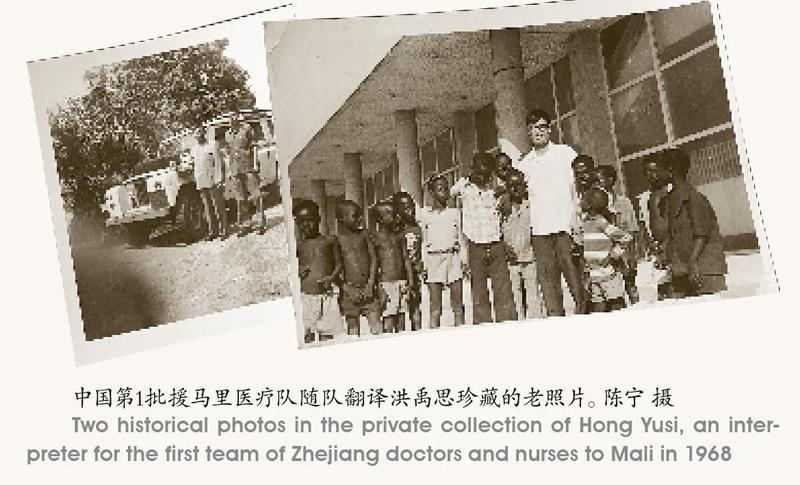
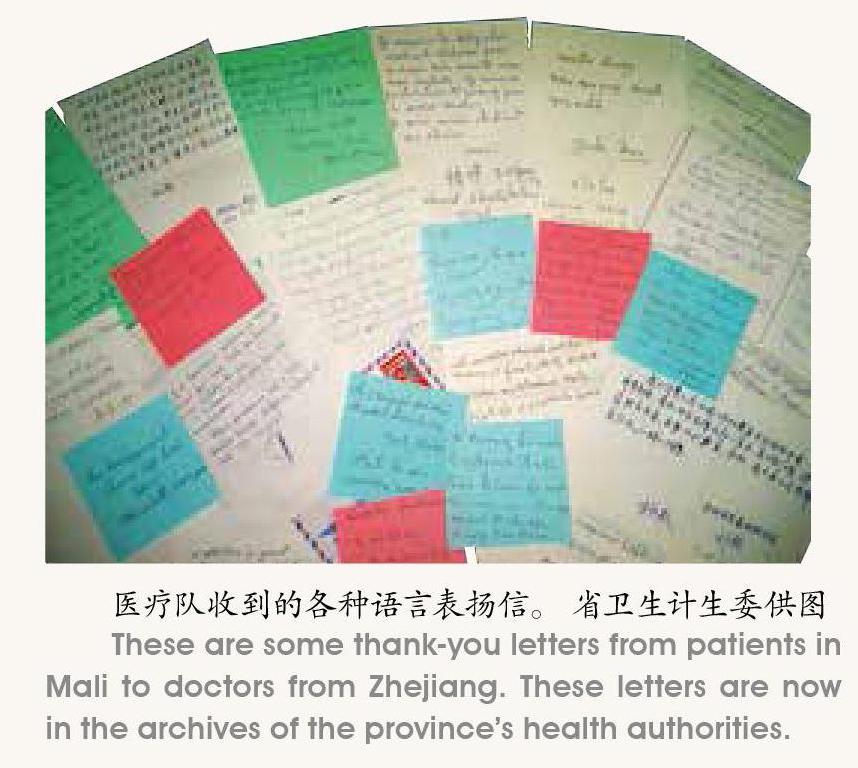
“我们只有一个信念——勇往直前,迎接挑战,克服困难,完成任务。”马振山说。
妙手仁心大爱福泽一方民众
不畏艰苦、甘于奉献、救死扶伤、大爱无疆。以马尔格拉为起点,中国援马里医疗队先后在卡地、锡加索、巴马科驻点。他们循着尼日尔河的广阔流域,以饱满的工作热情,用仁心仁术帮助当地群众解除病痛,奏响了一曲曲生命之歌。
在环境恶劣,缺医少药的艰苦条件下,医疗队员创造了马里医疗史上无数个“第一”。
“这两例成功的手术也是现代医学的先例,它将载入马中合作的史册。”1982年10月,马里国家电台一则《卡地医院创马里医学史上首例》的新闻,让中国第7批援马里医疗队队员李世骐的名字,传遍尼日尔河畔。
中国第8批援马里医疗队随队翻译朱耀传回忆说,其中一例“切除前臂恶性肿瘤段,再行肢体再植”的手术十分艰难,进行了整整6个小时。当地没有电子显微设备,李世骐就将自己带的放大镜绑在眼睛上;当地医院没有缝合条件,李世骐用的还是从杭州带去的针线。
李世骐的故事被口口相传,数不清的病人排着队上门寻找这位中国医生……1984年,李世骐完成两年援非任务,受当地医院的邀请,又在马里多留了一年。
马里特殊的局势和社会环境,使得医疗队发挥着不可替代的作用。队员们说,那里的人民很需要他们。
2012年3月,马里医院负责抢救一名从高处坠落的中国伤员。“伤员伤情比较严重,由队员护送回国。”第22批援马里医疗队队员周驰回忆,由于时间紧迫,这位难得踏上祖国土地的队员在北京的机场做过简单交接之后,又匆匆返回马里。
2014年3月以来,西非部分国家出现埃博拉疫情。马里自10月23日发现首例输入性确诊埃博拉病例以来,在1个多月的时间里,共确诊7例。在此期间,中国第23批援马里医疗队及时制定抗埃博拉应急预案,一直坚守工作岗位。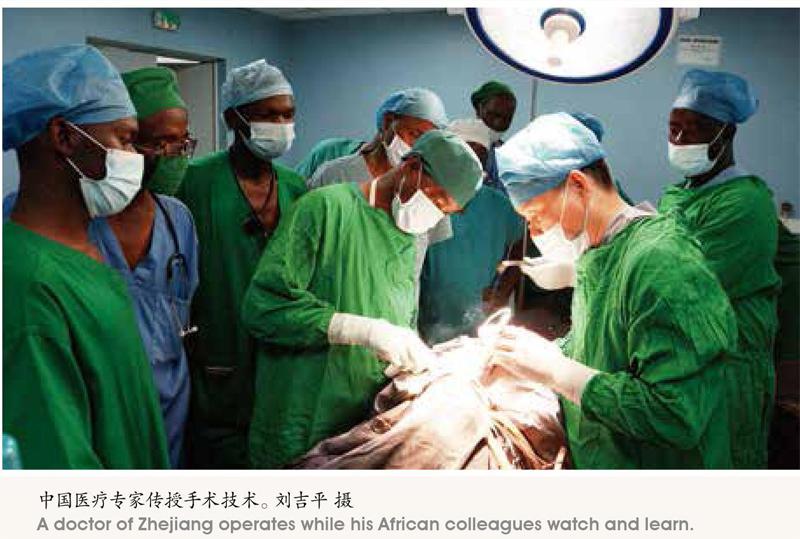
2015年11月20日,巴马科丽笙酒店发生恐怖袭击事件。接到指令后,中国第24批援马里医疗队立即携带急救箱、水和干粮赶赴离现场仅500米的安置中心。
医疗队还将新的医疗技术和医疗改革项目落地马里,帮助马里改善医疗条件。
上世纪80年代,中国医疗队开始在卡地驻点,并重点支持卡地医院的骨科建设。如今虽然撤销了驻点,但精湛的技术却留在了当地。时至今日,卡地医院的骨科实力依然是马里最强的。“这是中国医生立下的功劳。”医院院长索古巴说。
中国第24批援马里医疗队队员陆秀娥将妇科内分泌疾病和不孕不育的诊治技术留在了当地。医疗队还将HPV病毒的早期免费筛查带到当地,令万千妇女受益。
马里医院长期医药分离,医疗队出面与当地卫生部门多方沟通,为部分医用耗材建立了稳定的供销渠道。
为加强两国医学领域的交流,医疗队还选拔当地医生远赴杭州学习。
……
半个世纪的时间轴上,马里医院是绕不开的里程碑。2006年,中国在“中非合作论坛北京峰会”上承诺,为非洲援建30所综合医院。2010年,一座崭新的医院在马里首都巴马科落成,并于2011年成为30所援建医院中首家开放的。7年来,这里成为几批医疗队队员的“主战场”。
马里医院建成后的一年内,马里医院放疗中心随即落成,并于2014年4月正式投入使用。它是整个西非地区唯一一家放疗中心,每年收治200多例马里当地肿瘤患者,同时为来自多哥、贝宁、科特迪瓦等周边国家的50余例肿瘤患者提供服务,结束了当地患者只能靠化疗治疗恶性肿瘤的历史。
珍贵记忆中马友谊代代相传
在医疗队驻地,墙上挂着一面鲜艳的五星红旗,下方是一行醒目的红色大字:祖国在我心中。老队员们回忆,这六个字早在援马里医疗队在卡地驻点时就已经贴在墙上。这句响亮的话语,给了不同年代的队员们相同的信念。
洪禹思,中国第1批、第4批、第7批援马里医疗队随队翻译,是省内唯一精通邦巴拉语的人。退休后,他依然主动承担着每一批医疗队的语言培训工作,用一本自编的小册子,把没有文字的邦巴拉语常用语教给医疗队队员。“我们把美好的青春献给了医疗队。”50年后的今天,这位老队员翻出两张1968年的老照片,回顾着马里岁月,感慨万千。
洪禹思的精神也影响着他的女儿洪敏,洪敏从小立志从医,并于2015年随队支援马里。
马振山、朱耀传、戎永华、魏建功……在一份我省援马里医疗队队员的不完整名单中,同样的名字数次出现在不同批次的医疗队中。他们怀着使命与担当,出发,再出发。
50年的岁月,也定格着两国医患的友情——“中国医生,您好!”一个个马里患者用这句简短的中国话,向一位位中国医生问好,道出一声声衷心的感谢。
中国,也定格为一代又一代马里人的共同记忆。
“与中国相遇是一件幸福的事。”马里医院院长嘎内能说一口流利的中文。这位中国医疗队的老朋友,与中国有着近40年的渊源。1974年,嘎内先后在北京语言大学、北京医科大学留学。1980年开始在马尔格拉工作,自此与中国医疗队结缘。2011年,马里医院落成后,他担任院长一职。其间,见证了一批批中国医疗队在马里救死扶伤。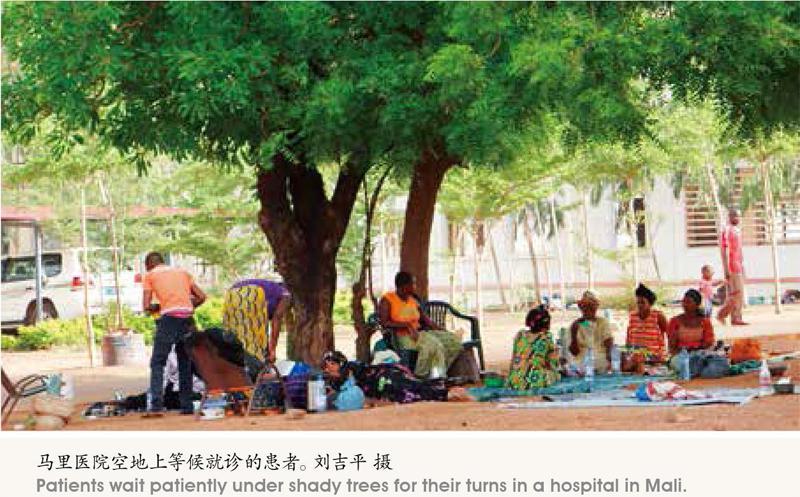
“醫疗队还在遥远的马里传播着中国文化。”中国驻马里大使陆慧英对记者说起一个小细节:刚到马里工作时,她遇到马里当地的官员,他们随口就唱起了《东方红》等中国歌曲。他们告诉陆慧英,这些歌曲都是小时候村子里的医疗队队员一句一句教给他们的。
走过五十载,中国医疗队与马里的故事,仍在继续……
Over the past 50 years, Zhejiang, a province in the east of China, has sent altogether 25 teams of doctors and nurses one after another to Mali to help local people. The first team from Zhejiang consisted of 20 medical workers in various disciplines and arrived in Mali on February 12, 1968. The team stationed in Markala, a commune in Malis Ségou Region on the Niger River and 285 kilometers from Bamako, capital city of the western African country.
Back then, working and living conditions were extremely challenging. Chinese doctors needed to fetch water from the Niger River every day. The local hospital did not even have devices to determine blood types. Chinese doctors used their own blood types as bases to find out the blood types of their African patients. To save the life of an African woman who was giving birth to a child, the gynecologist Chen Qiubo donated her own blood and did blood transfusion, starting the blood transfusion practice at the local hospital.
Ma Zhenshan, leader of the first team in Mali, recalls in an essay one of the biggest challenges the medical team faced in the African country. “At first, local residents did not trust the doctors from China due to some misunderstanding. But pretty soon, they changed their minds. Within a few years, the medical workers from Zhejiang spread their fine reputation all over Mali. Some patients even came from neighboring countries.”
Over the five decades, the doctors from Zhejiang have moved their bases several times and based themselves respectively in Kati, Sikasso and Bamako, all important cities in the river valley of the Niger.
The doctors and nurses from Zhejiang have done some medical work never seen before in Mali. In October 1982, the surgeon Li Shiqi became a household name in the country. He amputated an arm of a patient and after cutting off the tumor part from the arm, he replanted the severed arm. Without a microscope, he fastened a magnifying glass to one of his eyes to do the operation. To do the sutures, he used the needles and threads which had been brought all the way from Hangzhou, capital city of Zhejiang Province. The operation lasted 6 hours. The news of the miraculous operation spread fast and patients flooded in to seek the assistance of the Chinese doctor. Lis two-year work term expired in 1984 and he stayed another year there at the invitation of the hospital.
The doctors and nurses from Zhejiang have responded to national emergencies in the African country. As of March 2014, Ebola plague cases were being reported in western African countries. The first case in Mali was diagnosed and confirmed on October 23. Within a month, seven cases were diagnosed and reported. The 23rd medical team from Zhejiang formulated an emergency response plan and its daily work proceeded normally during the plague period.
On November 20, 2015, Islamist militants took 170 hostages and killed 20 of them in a mass shooting at the Radisson Blu hotel in Bamako, the capital city of Mali. The medical workers of the 24th team from Zhejiang received an instruction to respond immediately to the emergency. They set up a medical center at a spot only 500 meters from the hotel and filled the center with supplies such as first-aid kits, bottled water and food.
What doctors and nurses from Zhejiang have brought to Mali is more than fifty years of medical services. They have helped Mali to improve medical services there. In the 1980s, the teams from Zhejiang set up their base in Kati and considered the orthopedics department of the hospital in Kati as a key unit to improve its medical services. The teams provided training courses. Today, the orthopedics department is the best in Mali although the doctors and nurses from Zhejiang are no longer based in Kati. The hospital president owes the fame of the orthopedic surgery of the hospital to the doctors from Zhejiang.
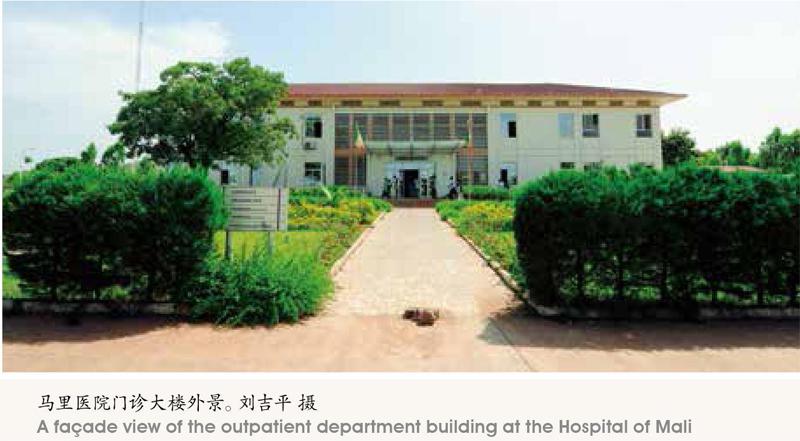
Lu Xiue, a doctor with the 24th team in Mali, brought latest expertise and technical know-how on medical conditions in womens infertility and endocrine system. Today, local doctors can provide proper diagnosis and treatment of diseases in these two fields.
China committed itself to funding and building thirty hospitals in Africa at the China-Africa 2006 Forum in Beijing. The construction of the Hospital of Mali in Bamako was concluded in 2010 and it became operational in 2011 as the first of the 30 hospitals in Africa. In the last seven years, doctors and nurses from Zhejiang have been based there. One year after the normal operation of the hospital, the radiotherapy center at the hospital began operating, making the hospital the only one that provides radiotherapy in the western Africa. About 200 local tumor patients are treated there every year. Moreover, about 50 patients from neighboring countries also come and receive radiotherapies at the hospital.
The medical workers from Zhejiang consider themselves working on behalf of China, as testified by Motherland in My Heart, a slogan painted in red on a wall of the living quarters of the medical team in Mali. Hong Yusi, the only fluent speaker of Bambara in Zhejiang Province, worked as an interpreter with the first, fourth and seventh teams in Mali from Zhejiang. Since his retirement, he has conducted language training courses with all the medical teams to be dispatched to Mali from Zhejiang. In 2015, his daughter Hong Min went as a doctor with a team to Mali. The 25 teams from Zhejiang have counted 825 people on a total list, but some doctors have returned to Mali with different teams. In total, they have taken care of 9.31 million out-patients and emergency cases in the past 50 years.